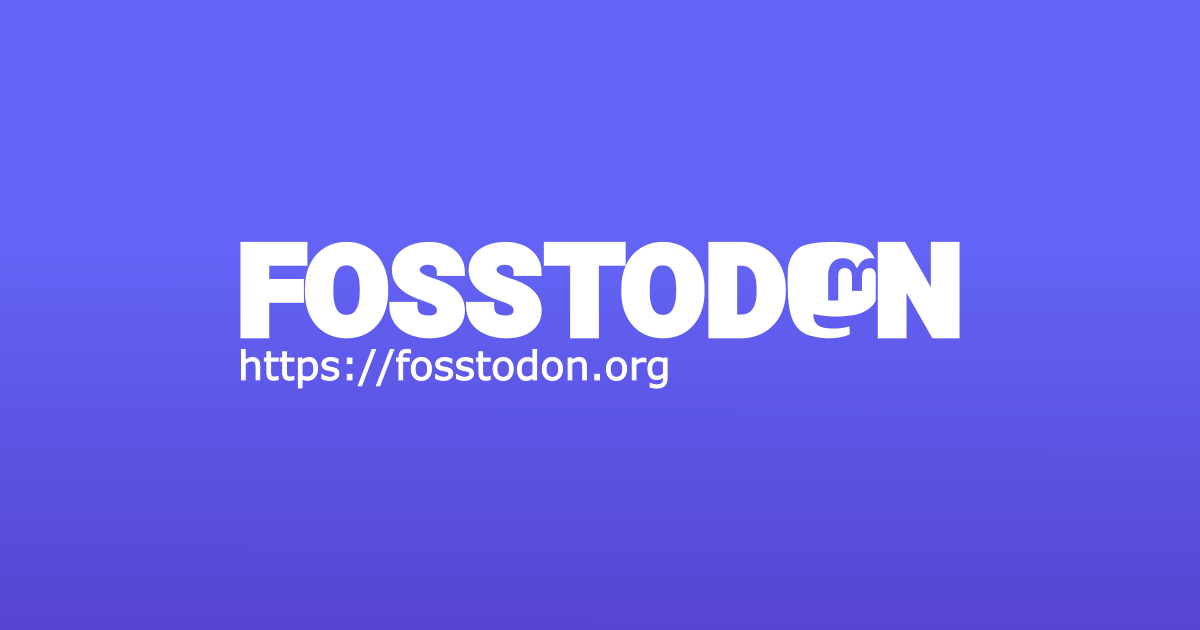qeef<p><span class="h-card" translate="no"><a href="https://babka.social/@serge" class="u-url mention" rel="nofollow noopener" target="_blank">@<span>serge</span></a></span> <a href="https://en.osm.town/tags/Scheme" class="mention hashtag" rel="nofollow noopener" target="_blank">#<span>Scheme</span></a> is awesome first language. I will tell you why.</p><p>(And my plan is to translate my book <a href="https://en.osm.town/tags/Nonprogrammer" class="mention hashtag" rel="nofollow noopener" target="_blank">#<span>Nonprogrammer</span></a> <a href="https://en.osm.town/tags/Neprogram%C3%A1tor" class="mention hashtag" rel="nofollow noopener" target="_blank">#<span>Neprogramátor</span></a> from my native (Czech) language to English in 2025, but you need to wait for that.)</p><p>Programming languages let you talk with the computer. In Scheme, a sentence starts with "(", then verb, i.e., *what* to do, then space-separated nouns, i.e., with *what* do that do, ending the sentence with ")".</p><p>Any other language with such an explanation?</p><p><a href="https://neprogramator.cz/neprogramator-zine-en.pdf" rel="nofollow noopener" translate="no" target="_blank"><span class="invisible">https://</span><span class="ellipsis">neprogramator.cz/neprogramator</span><span class="invisible">-zine-en.pdf</span></a></p>
fosstodon.org is one of the many independent Mastodon servers you can use to participate in the fediverse.

Fosstodon is an invite only Mastodon instance that is open to those who are interested in technology; particularly free & open source software.
If you wish to join, contact us for an invite.
Administered by:
Server stats:
8.6Kactive users
fosstodon.org: About · Status · Profiles directory · Privacy policy
Mastodon: About · Get the app · Keyboard shortcuts · View source code · v4.4.3
#neprogramator
0 posts · 0 participants · 0 posts today
qeef<p><span class="h-card" translate="no"><a href="https://vhsky.cz/accounts/openalt" class="u-url mention" rel="nofollow noopener" target="_blank">@<span>openalt</span></a></span> <a href="https://en.osm.town/tags/Neprogram%C3%A1tor" class="mention hashtag" rel="nofollow noopener" target="_blank">#<span>Neprogramátor</span></a> na <a href="https://en.osm.town/tags/peertube" class="mention hashtag" rel="nofollow noopener" target="_blank">#<span>peertube</span></a> :) aktualizoval jsem embedded video na <a href="https://neprogramator.cz/" rel="nofollow noopener" translate="no" target="_blank"><span class="invisible">https://</span><span class="">neprogramator.cz/</span><span class="invisible"></span></a></p><p>Také připomínám <a href="https://en.osm.town/tags/zine" class="mention hashtag" rel="nofollow noopener" target="_blank">#<span>zine</span></a> </p><p><a href="https://neprogramator.cz/neprogramator-zine-cs.pdf" rel="nofollow noopener" translate="no" target="_blank"><span class="invisible">https://</span><span class="ellipsis">neprogramator.cz/neprogramator</span><span class="invisible">-zine-cs.pdf</span></a></p><p>Kvůli kvalitě tisknout z PDF! Obrázky jsou jen lákadlo...</p><p><a href="https://en.osm.town/@qeef/113538326713945078" rel="nofollow noopener" translate="no" target="_blank"><span class="invisible">https://</span><span class="ellipsis">en.osm.town/@qeef/113538326713</span><span class="invisible">945078</span></a></p>
qeef<p>I finished my first <a href="https://en.osm.town/tags/zine" class="mention hashtag" rel="nofollow noopener" target="_blank">#<span>zine</span></a> yesterday. Today, I translated it into English.</p><p><a href="https://neprogramator.cz/neprogramator-zine-en.pdf" rel="nofollow noopener" translate="no" target="_blank"><span class="invisible">https://</span><span class="ellipsis">neprogramator.cz/neprogramator</span><span class="invisible">-zine-en.pdf</span></a></p><p>source: <a href="https://codeberg.org/Neprogramator/zine" rel="nofollow noopener" translate="no" target="_blank"><span class="invisible">https://</span><span class="ellipsis">codeberg.org/Neprogramator/zin</span><span class="invisible">e</span></a></p><p>It's another attempt of how to explain <a href="https://en.osm.town/tags/programming" class="mention hashtag" rel="nofollow noopener" target="_blank">#<span>programming</span></a> to nonprogrammers who care and I still think that <a href="https://en.osm.town/tags/Racket" class="mention hashtag" rel="nofollow noopener" target="_blank">#<span>Racket</span></a> (or <a href="https://en.osm.town/tags/Scheme" class="mention hashtag" rel="nofollow noopener" target="_blank">#<span>Scheme</span></a>) is perfect for this.</p><p>I usually try to approach problems I work on systematically, so the side effect of my first zine is the pdflatex zine template <a href="https://git.sr.ht/~qeef/pdflatex-zine-template" rel="nofollow noopener" translate="no" target="_blank"><span class="invisible">https://</span><span class="ellipsis">git.sr.ht/~qeef/pdflatex-zine-</span><span class="invisible">template</span></a></p><p>Just wanted to share it, it maybe could help someone?</p><p><a href="https://en.osm.town/tags/Neprogram%C3%A1tor" class="mention hashtag" rel="nofollow noopener" target="_blank">#<span>Neprogramátor</span></a></p>
qeef<p><a href="https://en.osm.town/tags/Neprogram%C3%A1tor" class="mention hashtag" rel="nofollow noopener" target="_blank">#<span>Neprogramátor</span></a> <a href="https://en.osm.town/tags/zine" class="mention hashtag" rel="nofollow noopener" target="_blank">#<span>zine</span></a>: Shrnutí do kapsy na osmi stránkách formátu A7.</p><p><a href="https://neprogramator.cz/" rel="nofollow noopener" translate="no" target="_blank"><span class="invisible">https://</span><span class="">neprogramator.cz/</span><span class="invisible"></span></a></p>
qeef<p><a href="https://en.osm.town/tags/Neprogram%C3%A1tor" class="mention hashtag" rel="nofollow noopener" target="_blank">#<span>Neprogramátor</span></a> na <a href="https://en.osm.town/tags/OpenAlt" class="mention hashtag" rel="nofollow noopener" target="_blank">#<span>OpenAlt</span></a>. Myslím, že dobrý.</p><p>Záznam videa jsem přidal na <a href="https://neprogramator.cz/" rel="nofollow noopener" translate="no" target="_blank"><span class="invisible">https://</span><span class="">neprogramator.cz/</span><span class="invisible"></span></a></p><p><a href="https://www.openalt.cz/2024/" rel="nofollow noopener" translate="no" target="_blank"><span class="invisible">https://www.</span><span class="">openalt.cz/2024/</span><span class="invisible"></span></a></p>
qeef<p>První tři části – Kouzelný jazyk, kouzelná hůlka, Dialog s kouzelnou hůlkou a Kouzelné čtení – jsou k přečtení se spustitelnými příklady:</p><p><a href="https://neprogramator.cz/precti/" rel="nofollow noopener" translate="no" target="_blank"><span class="invisible">https://</span><span class="">neprogramator.cz/precti/</span><span class="invisible"></span></a></p><p><a href="https://en.osm.town/tags/Neprogram%C3%A1tor" class="mention hashtag" rel="nofollow noopener" target="_blank">#<span>Neprogramátor</span></a></p>
qeef<p>Tak to vypadá, že zbývá už jen epilog.</p><p><a href="https://cs.wikibooks.org/wiki/Neprogram%C3%A1tor" rel="nofollow noopener" translate="no" target="_blank"><span class="invisible">https://</span><span class="ellipsis">cs.wikibooks.org/wiki/Neprogra</span><span class="invisible">m%C3%A1tor</span></a></p><p><a href="https://en.osm.town/tags/Neprogram%C3%A1tor" class="mention hashtag" rel="nofollow noopener" target="_blank">#<span>Neprogramátor</span></a></p>
qeef<p><a href="https://neprogramator.cz/" rel="nofollow noopener" translate="no" target="_blank"><span class="invisible">https://</span><span class="">neprogramator.cz/</span><span class="invisible"></span></a></p><p><a href="https://en.osm.town/tags/Neprogram%C3%A1tor" class="mention hashtag" rel="nofollow noopener" target="_blank">#<span>Neprogramátor</span></a> </p><p>Ještě se to zlepší, slibuji.</p>
qeef<p>Nekonečně kouzelné jazykolamy</p><p><a href="https://en.osm.town/tags/Neprogram%C3%A1tor" class="mention hashtag" rel="nofollow noopener" target="_blank">#<span>Neprogramátor</span></a> </p><p>Poslední dvě kapitoly ("Kouzelné sloveso je kouzelné sloveso: rekurze" a "Nekonečná podstatná jména: seznamy") nastínily, jak čarodějové přistupují k nekonečnu. Nekonečno je vlastně opakování a je jedno, jestli se tím myslí opětovné vykonávání kouzelné věty nebo rozšiřování a zpracovávání seznamu.</p><p>[...]</p><p><a href="https://cs.wikibooks.org/wiki/Neprogram%C3%A1tor#Nekone%C4%8Dn%C4%9B_kouzeln%C3%A9_jazykolamy" rel="nofollow noopener" translate="no" target="_blank"><span class="invisible">https://</span><span class="ellipsis">cs.wikibooks.org/wiki/Neprogra</span><span class="invisible">m%C3%A1tor#Nekone%C4%8Dn%C4%9B_kouzeln%C3%A9_jazykolamy</span></a></p>
qeef<p>"Kouzelné sloveso je kouzelné sloveso: rekurze" je zatím poslední hotová kapitola <a href="https://en.osm.town/tags/wikiknihy" class="mention hashtag" rel="nofollow noopener" target="_blank">#<span>wikiknihy</span></a> <a href="https://en.osm.town/tags/Neprogram%C3%A1tor" class="mention hashtag" rel="nofollow noopener" target="_blank">#<span>Neprogramátor</span></a> </p><p><a href="https://cs.wikibooks.org/wiki/Neprogram%C3%A1tor/Kouzeln%C3%A9_sloveso_je_kouzeln%C3%A9_sloveso:_rekurze" rel="nofollow noopener" translate="no" target="_blank"><span class="invisible">https://</span><span class="ellipsis">cs.wikibooks.org/wiki/Neprogra</span><span class="invisible">m%C3%A1tor/Kouzeln%C3%A9_sloveso_je_kouzeln%C3%A9_sloveso:_rekurze</span></a></p><p>A taky jsem nejspíš dořešil strukturu celé knihy -- přibyl "Čarodějnický žargon" a "Epilog Neprogramátora". Snad už to bude všechno, teď to jen dopsat...</p><p>Hlavně tedy k tomu žargonu bych rád věděl, s čím že se to ti neprogramátoři setkávají a co je trápí.</p>
qeef<p>Tak ještě "Nekonečně kouzelné jazykolamy" a první verze <a href="https://en.osm.town/tags/wikiknihy" class="mention hashtag" rel="nofollow noopener" target="_blank">#<span>wikiknihy</span></a> <a href="https://en.osm.town/tags/Neprogram%C3%A1tor" class="mention hashtag" rel="nofollow noopener" target="_blank">#<span>Neprogramátor</span></a> bude hotová.</p><p><a href="https://cs.wikibooks.org/wiki/Neprogram%C3%A1tor" rel="nofollow noopener" translate="no" target="_blank"><span class="invisible">https://</span><span class="ellipsis">cs.wikibooks.org/wiki/Neprogra</span><span class="invisible">m%C3%A1tor</span></a></p><p>Nebo hotová... ještě chci přidat něco jako "Kouzelnické triky" a popsat minimálně side effects a OOP. A asi systematický přístup k řešení problémů stylem "Rozděl a panuj", jako je v <a href="https://en.osm.town/tags/HTDP" class="mention hashtag" rel="nofollow noopener" target="_blank">#<span>HTDP</span></a>. A možná makra. A možná mě napadne ještě něco, ale nechci jít moc do hloubky; chci aby Neprogramátor byl čitelný pro neprogramátory.</p>
qeef<p>Třetí část kouzelného čtení <a href="https://en.osm.town/tags/wikiknihy" class="mention hashtag" rel="nofollow noopener" target="_blank">#<span>wikiknihy</span></a> <a href="https://en.osm.town/tags/Neprogram%C3%A1tor" class="mention hashtag" rel="nofollow noopener" target="_blank">#<span>Neprogramátor</span></a> se mi trochu vymkla (rozuměj je delší). Snad to není tak strašné.</p><p><a href="https://cs.wikibooks.org/wiki/Neprogram%C3%A1tor/Kouzeln%C3%A9_%C4%8Dten%C3%AD" rel="nofollow noopener" translate="no" target="_blank"><span class="invisible">https://</span><span class="ellipsis">cs.wikibooks.org/wiki/Neprogra</span><span class="invisible">m%C3%A1tor/Kouzeln%C3%A9_%C4%8Dten%C3%AD</span></a></p>
qeef<p>"Myslím si, že Aaronova představa programování jako čarování je vlastně docela přesná. Čaroděj vytvoří kouzelnou větu v neznámém jazyce, neznámého významu, která se neznámo jak vykoná, aby nakonec dostal, co chtěl."</p><p><a href="https://cs.wikibooks.org/wiki/Neprogram%C3%A1tor" rel="nofollow noopener" translate="no" target="_blank"><span class="invisible">https://</span><span class="ellipsis">cs.wikibooks.org/wiki/Neprogra</span><span class="invisible">m%C3%A1tor</span></a></p><p>Dopsal jsem první část <a href="https://en.osm.town/tags/wikiknihy" class="mention hashtag" rel="nofollow noopener" target="_blank">#<span>wikiknihy</span></a> <a href="https://en.osm.town/tags/Neprogram%C3%A1tor" class="mention hashtag" rel="nofollow noopener" target="_blank">#<span>Neprogramátor</span></a></p>
TrendingLive feeds
Mastodon is the best way to keep up with what's happening.
Follow anyone across the fediverse and see it all in chronological order. No algorithms, ads, or clickbait in sight.
LoginDrag & drop to upload